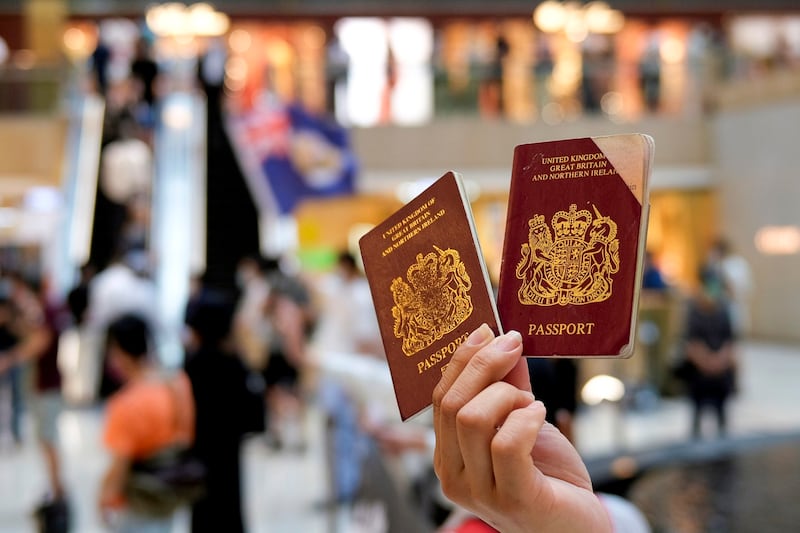Britain has further relaxed immigration rules for Hong Kongers seeking to resettle there in the wake of the Article 23 national security law that has intensified a crackdown on any kind of dissent.
Anyone wanting to apply for the British National Overseas, or BNO, visa route to long-term residency and eventual citizenship can now travel to the United Kingdom first, and apply from there, according to new rules posted to the Home Office website.
“You can apply for a British National (Overseas) visa from inside the UK if ... you’re in the UK as a visitor, [if] you’re in the UK on a different visa and want to switch to a BNO visa [or if] you’ve made an asylum claim,” according to the newly updated rules.
Some unsuccessful applicants may also be allowed to remain for up to 12 months in a bid to prove that they have enough money to support themselves, potentially allowing them to find work and then reapply, the website said.
The Safeguarding National Security bill, passed on March 19 under Article 23 of the city's Basic Law, includes sentences of up to life imprisonment for treason, insurrection, sabotage and mutiny, and 20 years for espionage.
It can punish people 10 years for crimes linked to “state secrets” and “sedition,” and allows for the China-issued Hong Kong Special Administrative Region passports of anyone who flees overseas to be revoked.
New flexibility
The London-based rights group Hong Kong Watch said it has already resulted in a deteriorating human rights situation in the city, citing the denial of early release of jailed “Captain America” activist Ma Chun-man under the law, as well as the dissolution of the opposition Civic Party.
Before the law, Ma would have been considered for a sentence reduction of up to one third for good behavior – a rule that now no longer applies to “national security” cases under the new law.

Last month, the British government made it easier for Hong Kong applicants to gain assistance from public funds, after relaxing rules allowing more applicants' partners to join them in the U.K.
An immigration consultant with the British advocacy group Hong Kong Aid who gave only his surname Chow for fear of reprisals said the new rules will give some flexibility to people seeking to leave Hong Kong urgently for political reasons in the wake of the Article 23 legislation.
“There is a lot of uncertainty in Hong Kong since Article 23 took effect,” Chow said. “This will change a lot of plans ... particularly for Hong Kongers who have been engaged in politics or in politically sensitive lines of work.”
“This policy may not affect very many people, but I think it’s a very important change, because ... it makes applying for a BNO visa less overwhelming,” Chow said, saying that the rules would be particularly useful for people in “emergency situations.”
Previously, anyone entering the U.K. on a tourist visa and applying for the BNO route to settlement had been rejected because they were seen as not being honest about their reasons for applying for a tourist visa, Chow said, citing dozens of cases he has worked to help people in that situation.
Priority in Canada
Some applicants could also fear drawing unwelcome attention from the Hong Kong authorities if they visit the U.K. Visa Application Center in North Point to record biometric data, or visit a clinic to do the mandatory test for tuberculosis, he said.
“Such actions may attract the attention of the authorities, meaning that they will know that they are planning to leave, so we think this policy is to protect those people,” Chow said.
But he warned anyone coming in on a tourist visa not to mislead immigration staff when asked why they had traveled to the U.K. on that visa.
They should make it clear that they are there as tourists, but that they will be submitting an application for a BNO visa on arrival, due to the changing political situation in Hong Kong, he said.
At least 191,000 people have applied to the BNO visa program so far, according to government figures released in November.
The rule changes come as authorities in Canada confirmed that priority processing remains in place for Hong Kongers applying for permanent residency in the country under the Hong Kong Pathway, following complaints of waiting times of several months for some applicants.
In a statement dated April 2, Hong Kong Watch called on the Canadian government to boost capacity to handle “thousands of applications,” and make it easier for work permit holders on the Hong Kong Pathway to extend those permits.
“Hong Kong Watch has recently assisted several applicants facing emergencies with obtaining PR status. We will continue to monitor the situation and help those in emergencies,” the group said.
It also called on the U.K. government to allow BNO visa holders to pay the lower university tuition fees offered to home students after three years’ residency.
Translated with additional reporting by Luisetta Mudie .
